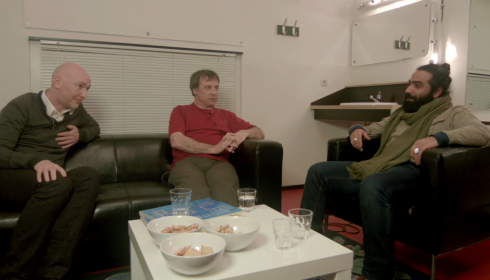
Mokhallad Rasem tells a timeless story about leaving behind your old world replete with reliable memories and customs and finding yourself in a new environment. After a long journey from somewhere across the ocean, a man and a five-year-old boy arrive at a refugee centre where they are given residence permits and new names. The past is a vague memory. <em>De kinderjaren van Jezus </em>after the book <em>The Childhood of Jesus</em> by Nobel prize-winner J.M. Coetzee.
What does it feel like to find yourself in a new environment having left behind your old world replete with reliable memories and customs? What is it like to live a life in which you don’t feel the absence of anything, a life washed clean of memories, without secret desires and yearnings? Does such a thing exist? And is it desirable? These questions are at the heart of <em>The Childhood of Jesus</em>, the recent novel by the South-African Nobel Prize winner J.M. Coetzee and the starting point for Mokhallad Rasem’s adaptation of the novel into a lively play for two men, two women and a child.
After a long journey from somewhere across the ocean, a man of indeterminate age and a five-year-old boy arrive at a refugee centre where they are given residence permits and new names, ‘Simon’ for the man and ‘David’ for the boy. Apart from the fact that they have to get by in Spanish, there are no clues whatsoever as to where they are. The past is a vague memory. They are newcomers, displaced persons in a strange environment. On the journey here little David lost his mother and Simon took care of him, like a sort of guardian or chaperon. Simon looks for somewhere to live and finds work, but his main objective is to find a mother for David – his mother?
In some respects the environment in which Simon and David find themselves is recognizable: people work, there are shops and houses and cars on the streets, people play tennis and there are schools and cultural centres. But familiar as all these things are, the atmosphere is unreal, strange. The inhabitants live peacefully side by side, seemingly with no great demands or desires, in a sort of egalitarian society which constantly takes Simon by surprise. People patiently explain to him, the ‘outsider’ who still lives by the rules of ‘old-fashioned thinking and feeling’, how things work in the new world. Adapting to a new environment and yet safeguarding your identity seems to be no easy feat. In fact it is such a big ask that Inès - the mother who is ‘found’ for David, the young and extraordinary child - will eventually want out of that new society.
Simon, Inès and David make their escape together…</p>
Ludo Teeuwen, an expert on Coetzee, wrote: “This novel resembles a will, a testament, a farewell to a weary old world which has to make way for the liberating world of the child.” To leave behind what is past and embrace the new without losing your identity, isn’t that the basic condition of many in our society? Or of us all? High time for Toneelhuis-maker Mokhallad Rasem to shed light on the subject.
text
- J.M. Coetzee
adaptation
- Guy Cassiers
- Mokhallad Rasem
performance
- Sabri Saad El Hamus
- Yamina Takkatz
- Mieke De Groote
- Filip Jordens
- Mokhallad Rasem
scenography
- Mokhallad Rasem
music
- Bassem Hawar
- Free Desmyter
composition
- Free Desmyter
publisher
- Uitgeverij Cossee
production
- Toneelhuis















